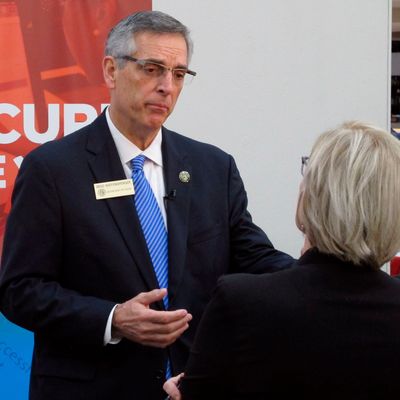
It’s not easy being a Republican election official these days. Many activists in your party’s base don’t regard voting as a right to begin with, and have been steeped for years in conspiracy theories whereby voter-friendly policies will enable Democrats to win elections with the support of ex-cons, undocumented immigrants, and welfare bums. On the other hand, it’s not exactly seemly for those whose job it is to help people vote to admit they are busily digging rather than filling potholes in the path to the ballot box (unless you are, say, Kris Kobach, who never courted the appearance of propriety as Kansas’s election chief).
An announcement today by Georgia secretary of State Brad Raffensperger (successor to the champion vote suppressor and now Governor Brian Kemp) is a good example of playing it both ways, as reported by the Atlanta Journal-Constitution:
Georgia Secretary of State Brad Raffensperger introduced proposals Wednesday to avoid another election debacle, calling for more voting locations, technical support and poll worker training.
That sounds good after the primary-day fiasco Georgia experienced on June 9, with long lines, malfunctioning voting machines, and overwhelmed staff at many polling places, particularly in metro Atlanta’s Democratic strongholds. With turnout likely to be much, much higher in November, the problems that plagued the state in the primary really have to be addressed.
Here’s the part the GOP base will enjoy:
He also targeted Fulton County’s problems and asked state lawmakers to pass a bill that would give the State Election Board power to intervene in county elections management.
While they are there patiently explaining how to operate voting machines to those Democrat-hired county officials, the state folks can also, of course, watch for voter fraud, a powerful, if largely imaginary, phenomenon to your GOP-base activist.
But here’s the chaser to Raffensperger’s cocktail of mixed messages:
Raffensperger said he won’t send absentee ballot request forms to 6.9 million Georgia voters again, as he did in the primary. Instead, he’ll create a website where voters can request absentee ballots themselves.
In part, Raffensperger is likely dealing with the blowback he experienced from fellow Republicans this spring who wondered why their secretary of State was making it easier to vote by mail even as President Trump was denouncing it as inherently fraudulent. More generally, though, this action probably reflects the GOP line that since the coronavirus has had its ass kicked by the president (with help from eager reopeners like Georgia’s Kemp), it’s time to return to business as usual in voting procedures as well as everything else.
If this is a trend, it could be very important, particularly if, as is likely, Republicans are guessing wrong about the pandemic’s quick demise. According to Ballotpedia, 29 states made special provisions to facilitate voting by mail in 2020 primaries. Fourteen (including Georgia) sent voting-by-mail applications to all or most registered voters, which meant voters did not have to initiate the process and figure it out on their own. Four states cut out the application step altogether and sent ballots directly to voters (not counting the five states that already have universal voting by mail). And in 11 of the 16 states that still require a specified excuse for voting by mail, they were suspended for primaries.
All told, this spring 45 states offered the kind of voting-by-mail accommodations that Trump considers fraudulent (unless he wants to do it himself). But it’s important to understand that only four states have set rules for November. Raffensperger’s decision to scale back voting-by-mail expedients in the general election could be a trendsetter, at least among Republicans who don’t want to find themselves looking down the barrel of a presidential tweet accusing them of abetting millions of illegal votes. That could mean more crowded in-person polling places than are strictly necessary and lower turnout, particularly if people are still afraid to go stand in lines with other people who may or may not wear masks or practice social distancing. And that may be the whole idea.






























